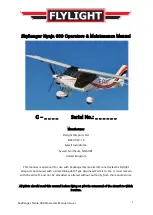
High Energy Sports Inc
714-632-3323
6
Preflight your Parachute
Follow procedures outlined above.
Inspect Bridle
Check the bridle for signs of damage that may have been caused by dirt, abrasion, or friction.
Pay special attention to the carabiner loop since damage caused by friction from the harness
is common.
The point of bridle entry into the parachute container (about 5’ from the carabiner
loop) may show signs of fraying due to Velcro damage.
Inspect Safety Pins
If they are rusty, clean them or replace.
Check Line Stowage
All lines should be enclosed in the deployment bag.
Inspect Safety Pin holders
Be sure the bungee (or rubber safety pin holder) is tight enough to hold the safety pin without
slipping. The bungee should be secured around the safety pin shaft only. If the bungee slips
above the shaft to the safety pin attachment on the handle it will not deploy. If your bungee is
too loose just slide the knot towards the loop of the bungee and thus tighten it up.
Inspect
Rubber bands
Be sure your rubber bands are strong. Replace rubber bands often. Do not double stow (wrap
then around the lines more than once). Use only the appropriate size rubber bands (#61).
Recommended Tools and Preparation for Packing
Rope or cord to secure both ends of the parachute to fixed points.
Weights to hold down folded canopy. (Telephone books work great!)
New rubber bands.
A clean dry area long enough to stretch out the canopy and lines.
1.
AIR CANOPY.
Practice throwing your parachute in a simulated deployment.
2.
LINE CHECK.
Check to see that radial seams (long seams with tape reinforcement) are
on the outside of the canopy. Thread an independent packing assist line through all the
packing tabs in an orderly sequence. Packing tabs are located at the junction of the radial
seam and the lateral band. Secure the rope to a fixed object. Stretch out canopy and lines
by pulling on the bridle with mild tension. Check the lines for twists by following two
adjacent lines from the skirt of the canopy to the bridle. Clear any twists. Secure the bridle
to a fixed object so there is mild tension on the parachute.
3.
INSPECTION.
Inspect the canopy and lines as outlined in Chapter 9 of THE
PARACHUTE MANUAL by Daniel Poynter. Check for tears, burns, broken stitches,
abrasion, or other malformations. Pay special attention to the bridle. Look for snags at the
point where the bridle goes into the parachute container, and for wear at the carabiner
loop. Replace the at the first sign of wear.





















